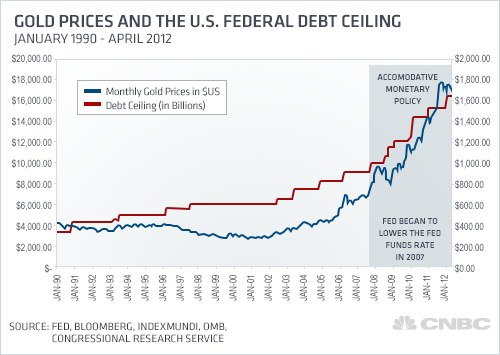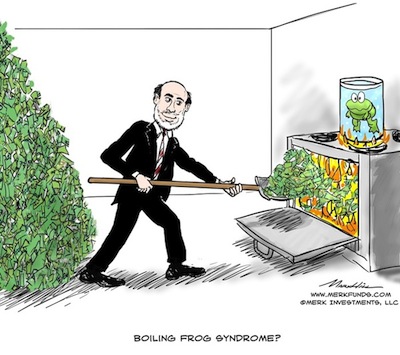Given that the world was supposed to have already ended this month, according to the long-dead Maya, and given that America is supposed to end in a few days from stumbling over the Fiscal Cliff, according to the way-too-lively Media, it is a wonder that gold has declined in value over the past few months. After all, it is supposed to be the refuge of last resort. Financial advisors have long argued that gold will always have some value -- no matter what!
The standard drivers of all commodities are, of course, supply and demand. However, the nation buying the most gold per person is India, whose economy has taken a pronounced swoon. To a lesser extent, the same is true for China. Reduced demand for gold therefore reduced the value of gold.
A less understood relationship driving the value of gold is the value of the dollar. With rising economic anxiety, investors worldwide have been buying dollars as a refuge of last resort, which drives up the value of the dollar. No matter what happens to America, the belief is that dollars will still command respect and retain value overseas. When the dollar rises in value, the value of gold decreases in this country.
When America resolves its current fiscal crisis and when Europe resolves its current financial crisis and when it is more clear that China is resuming its economic growth, the dollar will fall in value, and the price of gold should increase.
However, there is another relationship that should be examined. Take a look at this graph:

The standard drivers of all commodities are, of course, supply and demand. However, the nation buying the most gold per person is India, whose economy has taken a pronounced swoon. To a lesser extent, the same is true for China. Reduced demand for gold therefore reduced the value of gold.
A less understood relationship driving the value of gold is the value of the dollar. With rising economic anxiety, investors worldwide have been buying dollars as a refuge of last resort, which drives up the value of the dollar. No matter what happens to America, the belief is that dollars will still command respect and retain value overseas. When the dollar rises in value, the value of gold decreases in this country.
When America resolves its current fiscal crisis and when Europe resolves its current financial crisis and when it is more clear that China is resuming its economic growth, the dollar will fall in value, and the price of gold should increase.
However, there is another relationship that should be examined. Take a look at this graph:

It suggests that you should continue to hold gold as an investment as long as you believe our debt level will continue to rise. After all, borrowing money to pay entitlements -- puts more dollars into the economy -- without putting more gold into the economy. According to the Monetarist school of economics, that means more dollars chasing the same amount of gold; strongly suggesting that gold will resume its rise.
Now, if sequestration actually takes place, our deficit should decrease. Does that mean our national debt level would eventually decrease, pushing down the price of gold? If it does, I'll sell it then . . . not now.

